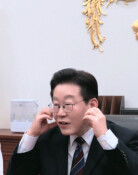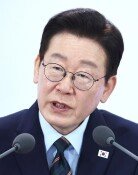[From Kwanghwamun] Hoping for a crisis-free year
[From Kwanghwamun] Hoping for a crisis-free year
Posted December. 29, 2000 18:47,
This has indeed been a year with its share of catastrophes and omens of economic ill. Early on in the year, many warnings of breakdowns at venture businesses were heard as the struggle between the two Hyundai heirs and the Daewoo Motor debacle slashed the stock market index by half. With a string of financial scandals adding fuel to the fire, many warned of a second economic crisis. Korea now faces a massive financial breakdown, with walkouts by union members at banks facing mergers and restructuring.
Needless to say, such premonitions of catastrophe and crisis place a heavy burden of anxiety on the people and businesses. Most have not yet forgotten the pain of the economic crisis three years ago. Unfortunately, the economic downturn seems to know no end as the premonitions of ill continue. A management organization found that the officials at all 100 top conglomerates were of the opinion that Korea would indeed face another economic crisis. If so, is the crisis unavoidable?
It may afford a bit of comfort to look to a country that survives so well amid constant premonitions of crisis. Our neighbor, Japan, may be the most talented when it comes to pressing on amid forebodings of ill. With the slightest rumbling, torrents of voices predict threats to the very survival of that nation. The devaluation of the yen, a growing national debt problem and a bureaucratic moral hazard crisis are just a few examples of the obstacles Tokyo faces. It seems as though they find a measure of relief through voicing such concerns.
To be more precise, many in Japan warned of a great crisis among export companies following the September 1985 Plaza Accord, which led to a steep rise in the yen. However, the result was surprisingly the opposite. Japanese manufacturers became the most competitive in the world. The nation took threats of crisis and turned them upside down.
Recently, many voices in Japan have been warning of yet another threat to their nation: national debt. These Cassandras warn that the national bonds issued by the Japanese government to obtain funds to revive the economy today will turn into a snowballing debt and bring the nation down in 2003. While this scenario is based on certain exaggerations, the Japanese people have recognized the seriousness of the situation and have made it an opportunity to find a solution.
Lately, the U.S. seems be learning from the Japanese. The prime example is recent warnings of the breakdown of the "new economy." Those alleging the collapse of the new economy regard the economic boom in the U.S. as resulting from the normalization policy and affected by the Asian currency crisis, a fortuitous by-product of another's tragedy. However, such allegations and warnings have ended up being good for America as they awakened the nation from its blind euphoria and forced supporters of the "new economy" to face the possible dangers. This awareness is helping stave off the free-fall.
There is a saying that "A crisis can never be predicted." It is only obvious that if a prediction is made in advance, than it buys the time necessary to face the crisis and find the solutions needed to prevent it. As such, if a crisis is predicted, it may never come.
However, in case of the Korean situation, there is a slight difference. Simply put, the "medicinal" value of the predictions seems to be null. In the past, such predictions put government officials in economic affairs on alert and they sought out solutions. Today, they are denying the predictions outright.
The problem is that the approach taken on the economic situation by businessmen and government officials is misguided. Is it because the government officials consider it a "business management crisis" while the businessmen consider it an "economic crisis?" Whatever the case may be, the proposed solutions contradict one another. While one side calls for "business restructuring," the other calls for "economic reform."
It is the heartfelt hope of the people not to have to hear such dire predictions again in the New Year. If the newspapers are criticized for fanning the fire with an endless stream of dire predictions, so be it. If such an overload can prevent a real crisis, it is all we could hope for.
Park Young-Kyun, Financial Editor



![[단독]폴란드, 韓 해군 최초 잠수함 ‘장보고함’ 무상 양도 안받기로](https://dimg.donga.com/c/138/175/90/1/wps/NEWS/IMAGE/2026/02/27/133437397.1.jpg)
![‘노인 냄새’ 씻으면 없어질까?…“목욕보다 식단이 더 중요”[노화설계]](https://dimg.donga.com/c/138/175/90/1/wps/NEWS/IMAGE/2026/02/27/133434557.3.jpg)


